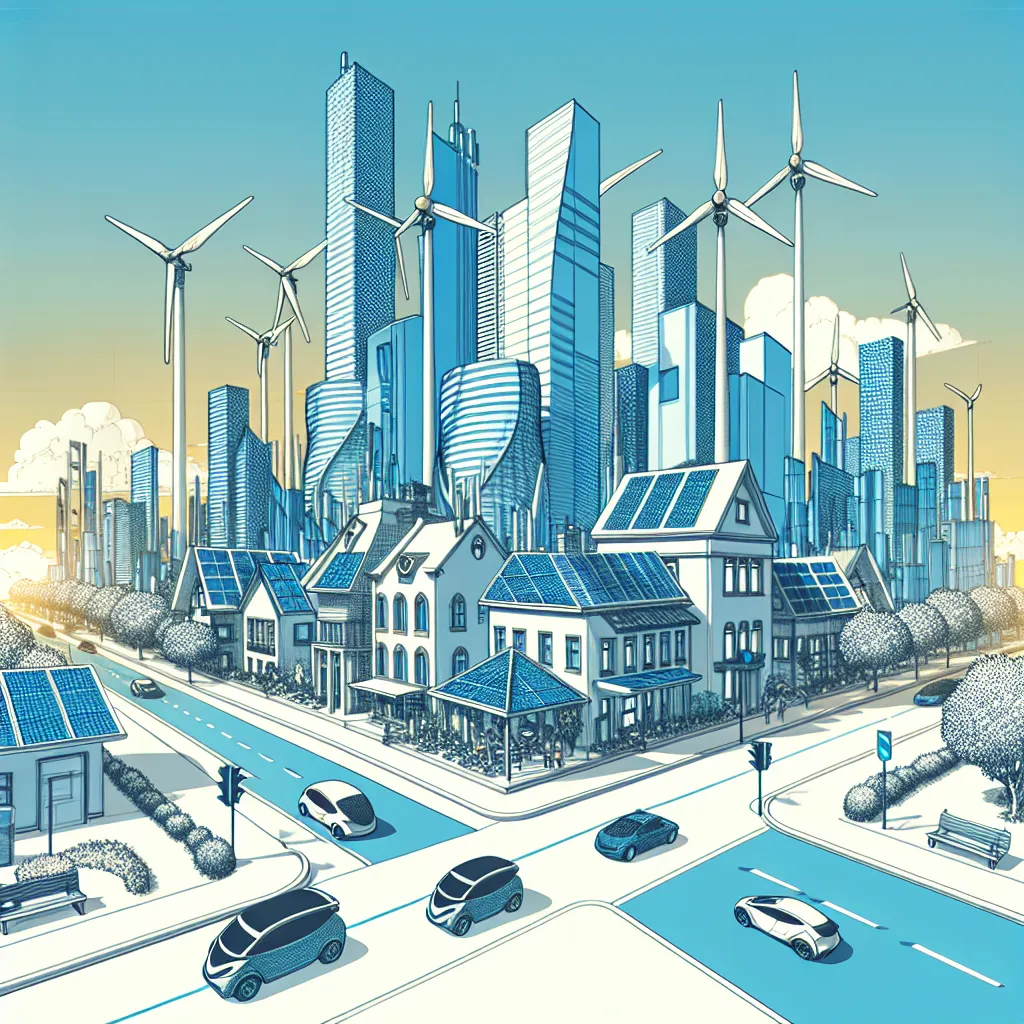As an IELTS Writing Task 2 expert, I’ve noticed that topics related to renewable energy and urban development have become increasingly prevalent in recent exams. The question of how to promote renewable energy in urban areas is particularly relevant, given the global focus on sustainability and climate change mitigation. In this article, we’ll explore a sample question on this topic, provide model essays for different band scores, and offer valuable insights to help you excel in your IELTS Writing Task 2.
Nội dung bài viết
Analyzing the Question
Let’s consider the following question, which is based on real IELTS exams:
Some people believe that the best way to promote renewable energy use in urban areas is through government regulations. Others argue that public education and awareness campaigns are more effective. Discuss both views and give your own opinion.
This question falls under the “discuss both views and give your opinion” category, which is common in IELTS Writing Task 2. It requires you to:
- Discuss the view that government regulations are the best way to promote renewable energy in urban areas.
- Discuss the view that public education and awareness campaigns are more effective.
- Provide your own opinion on which approach is more effective.
Model Essays
Band 8-9 Essay
In recent years, the promotion of renewable energy in urban areas has become a pressing concern for many cities worldwide. While some argue that government regulations are the most effective means to encourage the adoption of sustainable energy sources, others contend that public education and awareness campaigns yield better results. In my opinion, a combination of both approaches is necessary to achieve significant progress in this area.
Proponents of government regulations argue that legal frameworks and policies can create a strong incentive for businesses and individuals to transition to renewable energy. For instance, mandatory solar panel installation on new buildings or tax incentives for green energy adoption can drive rapid change in urban energy consumption patterns. Moreover, regulations can ensure a level playing field for all stakeholders, preventing free-riding and encouraging widespread participation in sustainability efforts.
On the other hand, advocates of public education and awareness campaigns emphasize the importance of fostering a culture of environmental consciousness. By informing citizens about the benefits of renewable energy and the long-term consequences of fossil fuel dependence, these initiatives can inspire voluntary action and lifestyle changes. Furthermore, education can empower individuals to make informed decisions about their energy consumption and support policies that promote sustainability.
In my view, the most effective approach to promoting renewable energy in urban areas involves a synergy between government regulations and public education. While regulations provide the necessary framework and incentives for change, education ensures that citizens understand and support these measures. This dual approach can create a positive feedback loop, where informed citizens demand stronger environmental policies, and well-crafted regulations further raise awareness and encourage sustainable practices.
In conclusion, the promotion of renewable energy in urban settings requires a multifaceted strategy. By combining the power of government regulations with the reach of public education campaigns, cities can foster a comprehensive and lasting shift towards sustainable energy consumption. This integrated approach not only addresses immediate energy needs but also cultivates a long-term commitment to environmental stewardship among urban populations.
(Word count: 309)
 Renewable Energy in Urban Areas
Renewable Energy in Urban Areas
Band 6-7 Essay
The promotion of renewable energy in urban areas is a hot topic these days. Some people think that government regulations are the best way to do this, while others believe that public education and awareness campaigns are more effective. In this essay, I will discuss both views and give my own opinion.
On one hand, government regulations can be a powerful tool to promote renewable energy. When the government makes laws, companies and people have to follow them. For example, if the government says that new buildings must have solar panels, then this will increase the use of solar energy in cities. Also, regulations can provide financial incentives like tax breaks for people who use renewable energy, which can encourage more people to switch.
On the other hand, public education and awareness campaigns can also be very effective. These campaigns can teach people about the benefits of renewable energy and how it can help the environment. When people understand why renewable energy is important, they might be more willing to use it even without regulations. Education can also help people make better choices about energy use in their daily lives.
In my opinion, both approaches are important and should be used together. Government regulations can create the rules and incentives needed to promote renewable energy, while education can help people understand and support these changes. By using both methods, we can create a stronger push towards renewable energy in urban areas.
To conclude, promoting renewable energy in cities requires both government action and public understanding. Regulations provide the framework for change, while education ensures that people are informed and supportive. By combining these approaches, we can make significant progress in increasing the use of renewable energy in urban areas.
(Word count: 282)
Writing Tips for Different Band Scores
When writing about promoting renewable energy in urban areas, consider the following tips to improve your essay:
For Band 8-9:
- Use sophisticated vocabulary and complex sentence structures.
- Provide specific examples and scenarios to support your arguments.
- Demonstrate a nuanced understanding of the topic by discussing potential challenges and long-term implications.
- Use cohesive devices effectively to ensure smooth transitions between ideas.
For Band 6-7:
- Use a mix of simple and complex sentences to express your ideas clearly.
- Include some topic-specific vocabulary, but ensure you use it correctly.
- Provide general examples to support your points.
- Maintain a clear structure with distinct paragraphs for each main idea.
Key Vocabulary to Remember
-
Renewable energy (noun) /rɪˈnjuːəbl ˈenədʒi/: Energy from sources that are naturally replenished, such as sunlight, wind, or geothermal heat.
-
Sustainability (noun) /səˌsteɪnəˈbɪləti/: The ability to maintain or support a process continuously over time.
-
Incentive (noun) /ɪnˈsentɪv/: Something that motivates or encourages someone to do something.
-
Infrastructure (noun) /ˈɪnfrəstrʌktʃə(r)/: The basic physical and organizational structures and facilities needed for the operation of a society or enterprise.
-
Carbon footprint (noun) /ˈkɑːbən ˈfʊtprɪnt/: The amount of carbon dioxide released into the atmosphere as a result of the activities of a particular individual, organization, or community.
-
Grid (noun) /ɡrɪd/: A network of lines that cross each other to form a series of squares or rectangles, especially in the context of power distribution.
-
Fossil fuels (noun) /ˈfɒsl fjuːəlz/: A natural fuel such as coal or gas, formed in the geological past from the remains of living organisms.
-
Energy efficiency (noun) /ˈenədʒi ɪˈfɪʃnsi/: The use of less energy to perform the same task or produce the same result.
Conclusion
Writing about promoting renewable energy in urban areas requires a good understanding of environmental issues, urban planning, and policy-making. By practicing with sample questions like the one provided and using the tips and vocabulary given, you can improve your ability to write high-scoring essays on this topic.
For further practice, consider writing essays on related topics such as:
- The role of technology in promoting renewable energy use in cities
- Balancing economic growth and environmental sustainability in urban development
- The challenges of implementing renewable energy systems in densely populated areas
Remember to practice writing essays regularly and share them in the comments section for feedback. This active approach to learning will help you improve your writing skills and prepare effectively for the IELTS exam.


